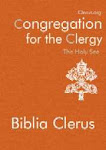But it is also a duty of the preacher to be more vigorous wherever the malice is greater. When perversity increases, says St. Gregory, preaching must not weaken, but on the contrary, it ought to become more vehement.
Interesting... instead we have pastors advocating perversity! go figure...
This quote is a good reminder of the relation between the works of mercy as it applies to a preaching order.
There are some who with love apply themselves to works of corporal mercy, but preaching, because it devotes all its zeal to the salvation of souls in danger of death, surpasses in excellence the above mentioned works, as the soul surpasses the body. For this reason Our Lord said to him who wished to bury his father: “Leave the dead to bury their own dead, but do thou go and proclaim the kingdom of God” (Luke 9:60). So that if it is necessary, according to this command, to place preaching above the duty of burying one’s father, one of the most pious of corporal works of mercy, how much more should preaching in general be placed above all the works which have as their object only the well-being of the body. Whoever by his word nourishes souls with everlasting food does more, St. Gregory observes, than he who gives material bread in order to preserve the life of the body.





















